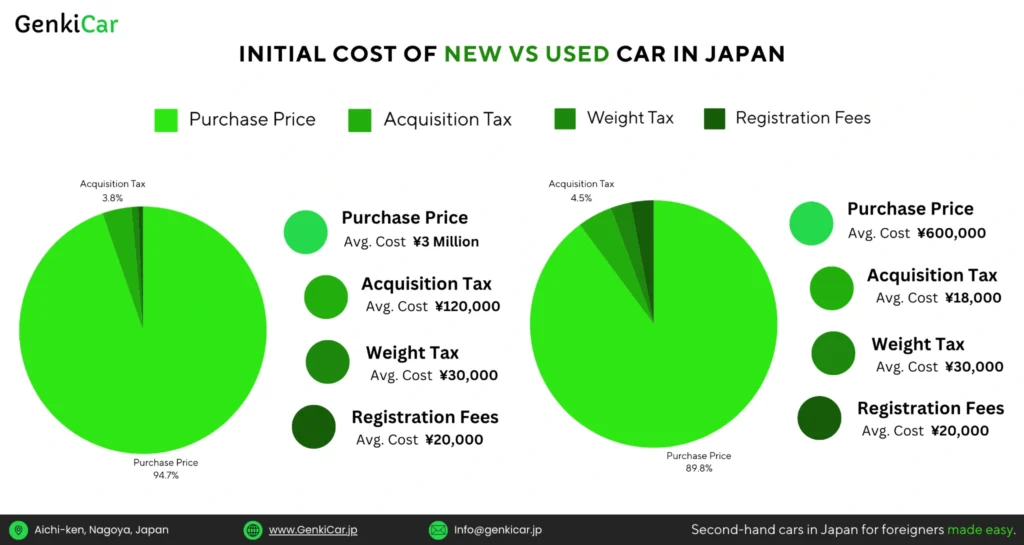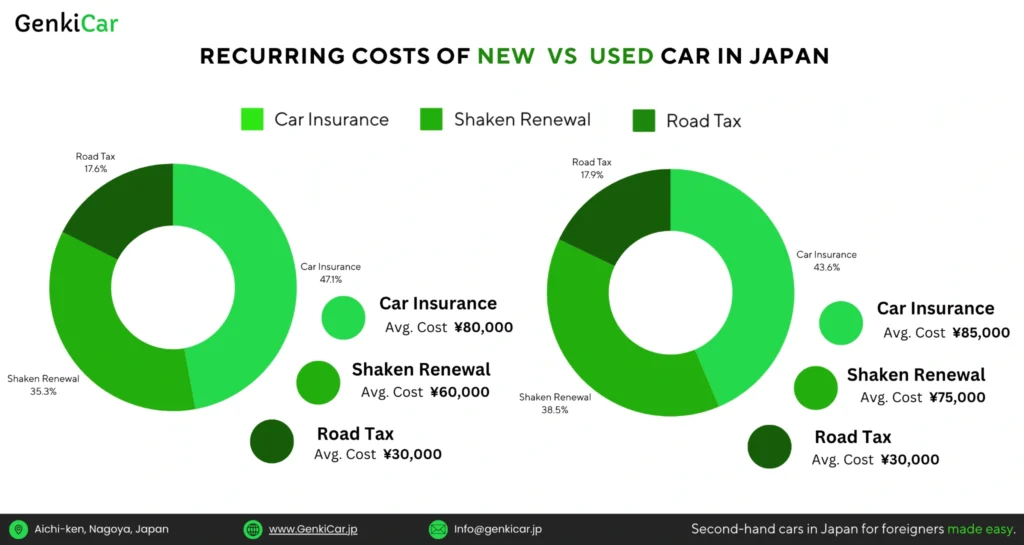Buying cars in Japan as a foreigner might seem complex, but with the right information, it becomes quite a straightforward process. In this guide, we will take you through understanding the eligibility requirements, the paperwork, as well as cost of buying a car in Japan, cultural considerations, and overcoming language barriers. Each step requires careful attention so make sure to follow through.
Step 1: Understanding Eligibility Requirements
To own and register a car in Japan, you need to have a valid visa or residency status. Here’s what you need to know:
- Valid Visa: You must hold a medium to long-term visa (e.g., work visa, student visa, spouse visa) to purchase and register a car. Short-term tourists are not eligible to buy a car in Japan.
- 住民票 (Jūminhyō): As a foreigner, you will need a Jūminhyō, which is a certificate of residence issued by your local city office. This document verifies your legal residence in Japan and is crucial for completing various official procedures, including registering a car.
Without a Jūminhyō, you won’t be able to register your car in Japan, as it proves that you have an address in the country where the vehicle can be linked.
Driver’s License Requirements
Owning a car also requires you to have a valid driver’s license. There are two main options for foreigners:
- International Driving Permit (IDP): If you’re staying in Japan for a short period (up to 12 months), you can drive using an IDP, which must be obtained in your home country. However, an IDP is a temporary solution and cannot be renewed within Japan.
- Japanese Driver’s License (運転免許証, Unten Menkyoshō): If you’re planning to stay in Japan for more than a year, you’ll need to obtain a Japanese driver’s license. For some countries, converting your foreign license is relatively straightforward through a process known as 外免切替 (Gaimen Kirikae).
This process typically involves submitting your foreign license, a translation from JAF (Japan Automobile Federation), and passing a basic vision test. For others, a driving test may be required.
Step 2: Choosing the Right Car
When it comes to buying cars in Japan, you’ll need to decide between purchasing a new or used vehicle. Both options are good and have their own pros and cons.
- New Cars: Buying a new car comes with the obvious advantages of zero wear and tear, and the reliability of a factory warranty. However, new cars are significantly more expensive in Japan, and you will still have to pay for registration, Shaken (vehicle inspection), and other mandatory fees.
- Used Cars (中古車, Chūko-sha): We recommend going the second-hand car path as it is often the more popular choice, especially for foreigners. Japan’s meticulous vehicle inspection system means that used cars are generally well-maintained. Additionally, prices for used cars are much lower, and since they are already registered, the associated costs could be lower than with a new car.
Foreigners in Japan often opt for 軽自動車 (Kei Cars). These vehicles are smaller, more affordable, and cheaper to maintain. Additionally, they come with lower taxes and insurance costs. They’re ideal for city driving and navigating Japan’s narrow streets. However, if you prefer larger vehicles for family use or long-distance travel, there are plenty of used sedans and SUVs available through trusted dealerships.
Where to go to buy cars in Japan?
There are 3 ways to buy cars in Japan:
- Dealerships (ディーラー, Dīrā): Both new and used car dealerships are widely available. Dealerships like Toyota, Nissan, and Honda often have English-speaking staff in urban areas.
- Online Car Marketplaces: Platforms like Goo-Net and CarSensor are popular for finding used cars among Japanese people. However, they only offer services in Japanese. Facebook marketplace is also a way to find cars in your area but it could be more complicated since you have to do the paperwork and registration yourself.
- Auctions: Car auctions are another popular way to buy used cars for local market as well as for export, but they require knowledge of the auction process and are often conducted in Japanese.
Interested in buying cars in Japan through Japanese car auctions? Contact us and we’ll match you with an English-speaking expert to walk you through the auction process.
Step 3: Registration and Paperwork
One of the most significant aspects of car ownership in Japan is the mandatory vehicle inspection, known as 車検 (Shaken). This inspection is required every two to three years, depending on the age of your car. Shaken is designed to ensure that vehicles on the road are safe and environmentally compliant.
The cost of Shaken can sometimes be high, ranging between ¥100,000 to ¥200,000, depending on the type and condition of the car. The inspection includes taxes, mandatory repairs, and insurance, making it a considerable expense for car owners in Japan.
Parking Space Certificate
Last but not least, you must prove that you have access to a legal parking space, especially in urban areas. This is done by obtaining a 車庫証明 (Shako Shomei) from your local police station. The parking space must be within a specific distance from your residence. Without this certificate, you cannot register your car. In major cities, renting a parking space can be expensive, so be sure to factor this into your overall costs.
Jūminhyō (Residency Certificate)
As mentioned earlier, the 住民票 (Jūminhyō) is a critical document for registering your car. It proves your residency and is necessary for both purchasing and registering a vehicle. You can obtain this document from your local city office.
Once you have all the necessary paperwork—Shaken, Shako Shomei, and Jūminhyō—you’re ready to complete the registration process and officially become a car owner in Japan.
What Are the Costs of Buying a Car in Japan?
When buying cars in Japan, you should consider both the initial and recurring costs. Japan’s car ownership system involves various fees beyond the purchase price, and failing to account for these can lead to unpleasant surprises we do not want. Here is a detailed breakdown of the financial commitments involved in owning a car in Japan.
Initial Costs
The most obvious cost is the purchase price of the car. Prices in Japan vary greatly depending on whether you buy a new or used vehicle. Here are some key points to consider:
- New Cars: New cars typically start around ¥1.5 million for a basic 軽自動車 (Kei car) and can go well beyond ¥4 million for larger sedans or SUVs. Japanese brands like Toyota, Nissan, and Honda dominate the market, but foreign car brands can be more expensive due to import taxes.
- Used Cars: Used cars are significantly cheaper. A reliable used car can cost between ¥300,000 and ¥1 million, depending on the model, age, and condition of the car. Be sure to account for the age of the car as this affects the frequency and cost of mandatory inspections.

Registration Fees and Taxes
In addition to the purchase price, several government fees must be paid to legally own and drive a car in Japan:
- Registration Fees (登録手数料, Tōroku Tesūryō): This is the cost to officially register the car in your name. It typically ranges between ¥10,000 and ¥30,000 depending on the type and size of the vehicle.
- Acquisition Tax (自動車取得税, Jidōsha Shutoku-zei): This is a tax based on the value of the vehicle at the time of purchase. The rate is generally 3% for Kei cars and 5% for regular vehicles. For example, if you buy a car worth ¥1 million, you could pay between ¥30,000 and ¥50,000 in acquisition tax.
- Weight Tax (自動車重量税, Jidōsha Jūryō-zei): The weight tax is paid during the initial registration and every time you renew your vehicle’s Shaken (vehicle inspection). The heavier the car, the higher the tax. For example, a standard car might cost between ¥10,000 and ¥50,000 for weight tax.
Recurring Costs
As mentioned earlier, 車検 (Shaken) is the mandatory vehicle inspection required every two to three years. For new cars, the first Shaken is due after three years, and every two years after that. This inspection covers safety checks, environmental compliance, and necessary repairs.
- Cost of Shaken: On average, Shaken can cost between ¥100,000 and ¥200,000, depending on the age and condition of the vehicle. This cost includes:
- Inspection fees
- Vehicle weight tax
- Mandatory insurance
The inspection can be done at a dealership, auto shop, or a Shaken center. Older cars or those in poor condition may incur higher costs due to necessary repairs.

Car Insurance
In Japan, you are legally required to have Compulsory Automobile Liability Insurance (自賠責保険, Jibaiseki Hoken). This insurance covers third-party injuries in case of an accident. However, it offers limited coverage, and many drivers opt for voluntary insurance (任意保険, Nini Hoken) for more comprehensive protection, including damage to your own vehicle and coverage for property damage.
- Cost of Insurance: The annual cost of insurance can vary based on the type of car, driver’s age, driving history, and coverage level. Jibaiseki Hoken typically costs around ¥15,000 to ¥30,000, while Nini Hoken can range from ¥50,000 to ¥100,000 or more, depending on the plan.
Road Tax
Another recurring cost is road tax (自動車税, Jidōsha-zei), which must be paid annually. The amount is determined by the type and engine size of your car.
- Kei Cars: ¥10,800 per year.
- Standard Cars: ¥30,000 to ¥50,000 per year, depending on engine size.
The tax bill is sent to your residence in May, and you can pay it at a convenience store, bank, or post office.
Here’s a table that includes the recurring costs associated with owning a car in Japan, with an average total for easy reference:
| Recurring Cost | Description | Estimated Price (JPY) |
| Shaken Inspection | Mandatory inspection every 2-3 years. Includes repairs, taxes, and inspection fees. | ¥100,000 – ¥200,000 |
| Compulsory Insurance (CALI) | Legal minimum third-party liability insurance. | ¥15,000 – ¥30,000/year |
| Voluntary Insurance | Additional coverage for damages or accidents. | ¥50,000 – ¥100,000/year |
| Road Tax (Jidōsha Zei) | Annual tax based on vehicle type and engine size. | ¥10,800 – ¥50,000/year |
| Maintenance | Regular oil changes, tire replacements, etc. | ¥30,000 – ¥50,000/year |
| Parking Fees (if applicable) | Monthly parking fees, especially in urban areas. | ¥10,000 – ¥30,000/month |
Average Total (per year):
Taking the middle range of all costs, the average recurring cost per year would be around ¥150,000 to ¥350,000, not including parking fees, which can add an extra ¥50,000 to ¥360,000 annually depending on location.
How Can You Overcome the Language Barrier When Buying Cars in Japan?
For many foreigners, the language barrier can be one of the most significant challenges when buying cars in Japan. Most dealerships, documents, and procedures are conducted entirely in Japanese, which can make the process confusing for non-Japanese speakers. Fortunately, there are various ways to overcome this barrier and ensure you have a smooth car-buying experience.

English-Speaking or Foreigner-Friendly Dealers
In major cities like Tokyo, Osaka, and Yokohama, there are several car dealerships that cater to the foreign community. These dealerships often have English-speaking staff who are familiar with the needs of foreigners and can guide you through the process in English. Some dealerships also offer support with paperwork, financing, and even after-sales service, which can be incredibly helpful.
Need to understand Japan’s Shaken inspection system before you buy? Let us connect you with a dealership that will explain inspection requirements in detail, fill out our form to get started!
Using Online Tools and Translation Apps
Worst case scenario, if you’re unable to find an English-speaking dealer, translation apps like Google Translate or DeepL can be lifesavers. You can use these tools to translate documents, website content, and even conversation in real-time when communicating with Japanese-speaking dealers.
- Tip: Always carry a translation app when visiting a dealership or processing paperwork to help bridge any language gaps during critical moments.
Hiring a Professional Translator
If you’re dealing with more complex situations—like purchasing a car through an auction or dealing with legal documents—you may want to hire a professional translator. Services like the Japan Automobile Federation provide translation services for official documents, which can be very useful when dealing with car registrations, licenses, and contracts.
Top 10 Most Common Japanese Terms in Car Buying
Understanding some essential Japanese terms can make buying cars in Japan much easier. Here’s a table of common terms you’ll likely encounter:
| Term (Japanese) | Romaji | Translation | Description |
| 車検 | Shaken | Vehicle inspection | Mandatory inspection every 2-3 years, includes safety checks and taxes. |
| 自動車税 | Jidōsha Zei | Automobile tax | Annual road tax based on the type and size of the vehicle. |
| 重量税 | Jūryō Zei | Weight tax | Tax based on the vehicle’s weight, paid during the Shaken process. |
| 任意保険 | Nini Hoken | Voluntary insurance | Optional car insurance beyond the mandatory coverage. |
| 自賠責保険 | Jibaiseki Hoken | Compulsory automobile liability insurance | Legal minimum insurance, covering third-party injury. |
| 名義変更 | Meigi Henko | Ownership transfer | Process of transferring vehicle ownership when buying or selling a car. |
| 車庫証明 | Shako Shomei | Parking space certificate | Proof of parking space required for vehicle registration in Japan. |
| 住民票 | Jūminhyō | Residency certificate | Document proving your address, needed for vehicle registration. |
| 軽自動車 | Kei Jidōsha | Kei car | Small, fuel-efficient cars, popular for their affordability and lower taxes. |
What Tips Can Help You Buy a Car in Japan?
If you’re well-prepared buying cars in Japan as a foreigner can be a rewarding experience. While the process may seem daunting, there are several strategies that can help you make the most out of your car purchase. Below are some practical tips to keep in mind, especially when it comes to negotiating the price and timing your purchase for maximum savings.
Negotiating the Price
In Japan, the approach to negotiation is different from many other countries, where haggling over prices is more common. Japanese culture tends to favor politeness, respect, and modesty in business dealings, and this extends to car buying. Here are a few key things to remember when negotiating:
- Modesty and Politeness: In Japan, aggressive or hard bargaining is often seen as rude. When negotiating, it’s important to remain polite, respectful, and humble. It’s common to inquire if a discount or special offer is available rather than directly asking for a price reduction. A typical phrase to use is:
- 値引きできますか? (Nebiki dekimasu ka?)
- Romaji: Nebiki dekimasu ka?
- Translation: Can you offer a discount?
- Small Reductions: Unlike in some countries where substantial price cuts are expected, in Japan, discounts tend to be modest. Instead of a large reduction, you might receive small perks, such as free accessories, car maintenance, or a minor price cut. For used cars, you may have more room to negotiate, but the process is still reserved compared to other markets.
- Dealer Reputation: Japanese car dealers take great pride in their reputation, so they may be less willing to engage in prolonged haggling. It’s often better to build rapport with the salesperson and inquire about available promotions rather than push for a large price cut.
Seasonal Deals and Discounts
Timing your car purchase in Japan can significantly affect the price. There are specific times of the year when dealerships are more willing to offer discounts or promotions. Here’s when you’re most likely to find good deals:
- End of the Fiscal Year (March): In Japan, the fiscal year ends in March, and many dealerships offer large discounts to meet their sales targets. This is one of the best times of the year to buy a car as dealers are motivated to clear their inventory.
- New Year Sales (January): Early in the year, dealerships often run 初売り (Hatsu-uri), or “first sales,” where new cars are sold at discounted rates, and special packages are offered to attract buyers. These promotions can include free accessories, extended warranties, or price reductions on certain models.
- Mid-Year Bonuses (June and December): Japanese employees typically receive bonuses twice a year, in June and December. Some dealers often capitalize on these bonus seasons by running sales events to attract buyers who have more disposable income at these times.
- Model Changeovers: When a new model is released, the older version is often discounted. If you’re not concerned about having the latest model, you can find excellent deals on last year’s cars just before or after the new models are launched.
Test Driving and Inspection
A pre-purchase inspection is crucial, especially when buying a used car in Japan. Even though Japan has a strict Shaken (車検) system that ensures cars on the road are safe, it’s still wise to have an independent mechanic or third-party service check the car before buying. This helps ensure that there are no hidden mechanical issues and that you’re making a sound investment.
For foreigners, some services offer English-language support, such as providing detailed inspection reports or connecting you with mechanics who specialize in foreign clients. A pre-purchase inspection can prevent costly repairs in the future and provide peace of mind.
6 things to Look for in a Test Drive
Test driving a car is an essential part of the buying process. When you go for a test drive, here are key things to check, particularly for used cars:
- Mileage (走行距離, Sōkō Kyori): Lower mileage usually means less wear and tear on the car, but it’s also important to ensure that the mileage is consistent with the car’s age. Be cautious of cars with suspiciously low mileage, as this could be a red flag.
- Engine and Transmission: Pay attention to how the engine sounds and feels. Does it start smoothly? Does it make unusual noises? When shifting gears, especially in automatic cars, make sure the transitions are smooth and without delay.
- Brakes: Ensure the brakes respond well, without excessive noise or vibration. Test them at both low and moderate speeds.
- Suspension and Steering: Check for any unusual vibrations or pulling to one side when driving. This could indicate issues with the suspension or alignment.
- Interior and Exterior Condition: Look for signs of rust, dents, or major repairs on the exterior. Inside, check the condition of the upholstery, dashboard, and electronics.
- Air Conditioning and Heating: Given Japan’s hot summers and cold winters, it’s important to test the AC and heating systems to ensure they work efficiently.
What Happens After You Buy a Car in Japan?
Once you’ve successfully purchased a car in Japan, there are a few important steps to complete before you can hit the road. From transferring ownership to updating your insurance and registration, the post-purchase process ensures that your new vehicle is legally in your name and fully covered. Here’s what you need to know about what happens after you buy a car in Japan.

Transferring Ownership
Transferring ownership of a car in Japan is a formal process that requires several key documents. Both the buyer and seller need to gather specific paperwork to ensure the ownership is correctly registered. Here’s a checklist of what you’ll need:
- Vehicle Registration Certificate (車検証, Shaken-shō)
This document shows the current registration details of the car and is needed to officially transfer ownership. - Title Transfer Form (譲渡証明書, Jōto Shōmeisho)
This document is signed by the seller and confirms that they are transferring ownership of the vehicle to the buyer. - Proof of Parking (車庫証明, Shako Shomei)
Before registering the car in your name, you must provide proof that you have a legal parking space for the vehicle, particularly if you live in urban areas. - Inkan (印鑑) and Inkan Registration Certificate (印鑑証明書, Inkan Shōmeisho)
In Japan, many official documents require the use of an inkan (personal seal), registered with the local government office. You’ll need a certified copy of your seal registration to transfer ownership. - Jūminhyō (住民票)
As part of the ownership transfer process, you’ll need to present your Jūminhyō, which proves your residential address in Japan. - Sales Contract (売買契約書, Baibai Keiyakusho)
This is a formal contract between you and the seller, outlining the terms of the sale, including the vehicle details and agreed-upon price. - Identification: A valid form of identification (e.g., residence card, passport) may also be required to complete the transfer.
Once all the necessary documents are submitted to the 陸運局 (Rikuunkyoku), or Land Transport Bureau, the ownership transfer will be officially recorded, and you’ll receive an updated vehicle registration in your name.
Updating Insurance and Registration Information
After the ownership transfer, it’s essential to update your insurance and registration information to reflect your new car.
Notifying Your Insurance Company
As a car owner in Japan, it is mandatory to have Compulsory Automobile Liability Insurance (自賠責保険, Jibaiseki Hoken) in place. If the car you purchased already has this insurance, it must be transferred to your name. You’ll need to provide your insurance company with:
- New Vehicle Registration Information: Once you have the new registration certificate, update your insurance provider with the correct details.
- Personal Information: Confirm your residency details, driver’s license number, and other relevant personal information.
- Voluntary Insurance (任意保険, Nini Hoken): If you’re opting for additional coverage, such as collision or comprehensive insurance, ensure that the voluntary insurance policy is also updated to reflect your ownership of the vehicle.
Registering Your Car with Local Authorities
Along with updating your insurance, you’ll need to ensure that your car’s registration is up to date with local authorities. Here’s what you’ll need to do:
- Update Registration: Once the ownership transfer is complete, make sure the registration with the 陸運局 (Rikuunkyoku) is correct, and that all taxes (such as the annual road tax) are being billed to you as the new owner.
- Pay the Annual Road Tax: 自動車税 (Jidōsha Zei), or automobile tax, is an annual obligation, and it’s your responsibility as the new owner to ensure it’s paid on time. The amount is determined by the type and engine size of the vehicle.
Final Thoughts:
Buying cars in Japan as a foreigner may initially feel complicated, but with the right information and preparation, it’s a manageable and rewarding process. Ensuring you have documents like the Juminhyo and Shako Shomei to understand recurring costs for Shaken inspections and Japanese car insurance, every step you take brings you closer to enjoying the freedom of driving in Japan.
Advice: Take the time to research dealerships and inspection requirements in your area and, if possible, reach out to English-friendly services for added peace of mind. With thoughtful planning and attention to the specific needs of car ownership in Japan, you’ll find the journey both achievable and worthwhile, giving you the flexibility and convenience to explore Japan at your own time and pace.





